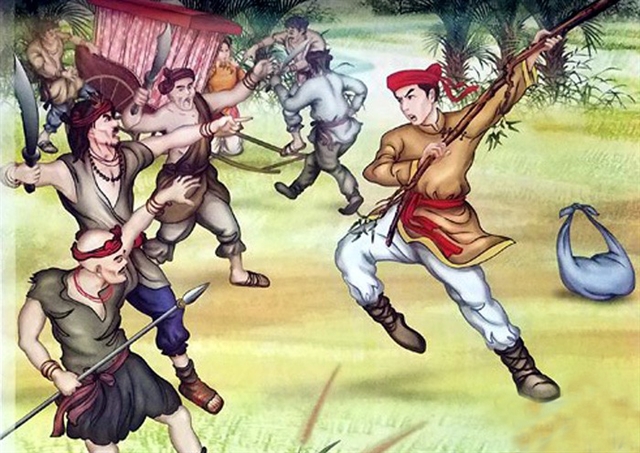
A painting from the book Lục Vân Tiên (The Tale of Lục Vân Tiên), an epic poem with 2,076 lines by late poet and teacher Nguyễn Đình Chiểu (1822 – 1888), one of the country’s leading writers in the 19th century. Photo courtesy of the Culture & Art Publishing House
HCM CITY — A series of cultural activities and art shows celebrating Vietnamese poet Nguyễn Đình Chiểu’s 200th birthday anniversary (July 1) are taking place in HCM City and southern provinces.
A special exhibition on poet Chiểu has opened and will run through July at the HCM City Museum.
The event is called Danh Nhân Văn Hoá Nguyễn Đình Chiểu- Cuộc Đời Và Sự Nghiệp (Man of Culture Nguyễn Đình Chiểu - Life and Career).
It features 95 photos, paintings and information about the poet, his life and career.
Chiểu’s famous literary works, including the epics Lục Vân Tiên (The Tale of Lục Vân Tiên) and Văn Tế Nghĩa Sĩ Cần Giuộc (Funeral Oration for the Partisans of Cần Giuộc), are also displayed.
Nguyễn Đình Chiểu (1822 – 1888) was born in Bình Dương District, Gia Định Province (now District 1, Hồ Chí Minh City).
He was a patriotic teacher, physician and poet of southern Việt Nam in the second half of the 19th century.
At around age 24, Chiểu contracted an eye infection and was soon blind. Just before this infection, Chiểu learned of his mother’s death, and according to legend, Chiểu was so heartbroken he was said to have gone blind with grief.
He opened a small school to teach poor students in Gia Định. He was also a popular medical practitioner who offered treatment for local people.
He later moved to Cần Giuộc in Long An Province (now Bến Tre Province), where he died.
Chiểu's Lục Vân Tiên was written in nôm (the old Chinese-based Vietnamese script) in the 1850s. It is one of the two most celebrated Vietnamese epic poems, along with Nguyễn Du’s Truyện Kiều (The Tale of Kiều) in the early 19th century.
The 2,076 line-work highlights the culture and lifestyle of southern people. Topics of love, loyalty, bravery and fair justice are featured.
The epic is used in textbooks for secondary high school students. It has been translated into many languages, including French, English and Japanese.
It has been adapted into many theatre plays of cải lương (reformed opera) and tuồng (classical drama) as well as movies.
Chiểu's Văn Tế Nghĩa Sĩ Cần Giuộc highlights patriotism. It features the author’s nationalism and anti-colonialism against the French colonisation of Cochinchina, the European name for the southern part of Việt Nam.
Another well-known work by Chiểu is Ngư Tiều Y Thuật Vấn Đáp (Medical discussion between fisherman and woodcutter). It includes useful information and knowledge on traditional Vietnamese medicine.
In Bến Tre Province, a ceremony to honour and celebrate Chiểu’s 200th birthday will take place on July 1 at the Nguyễn Đình Chiểu Temple, where the tomb and monument of the poet are located. Drama shows will be also staged.
The highlighted show will be Tiên Nga (Fairy Tale), a musical play based on Chiểu’s Lục Vân Tiên, by talented artists of the private drama theatre IDECAF of HCM City.
The play is about the life of Lục Vân Tiên, a poor student who travels to the capital to take a civil service examination for mandarins. He rescues Kiều Nguyệt Nga, a beautiful woman from a wealthy family, from a robbery. They fall in love but cannot be together because of feudal society's mores.
“We hope our musical show, Tiên Nga, will attract local people and visitors in Bến Tre – homeland of poet Chiểu,” said Huỳnh Anh Tuấn, owner and managing director of the IDECAF.
Last year, a proposal for the celebration of Chiểu’s 200th birthday anniversary was submitted and is expected to be approved by the UNESCO General Assembly in November.
The proposal has received support and recognition from South Korea, Thailand, Japan and India.
UNESCO has commemorated the birth anniversaries of four Vietnamese celebrities, including the late President Hồ Chí Minh, educator Chu Văn An, and poets Nguyễn Du and Nguyễn Trãi. — VNS
OVietnam